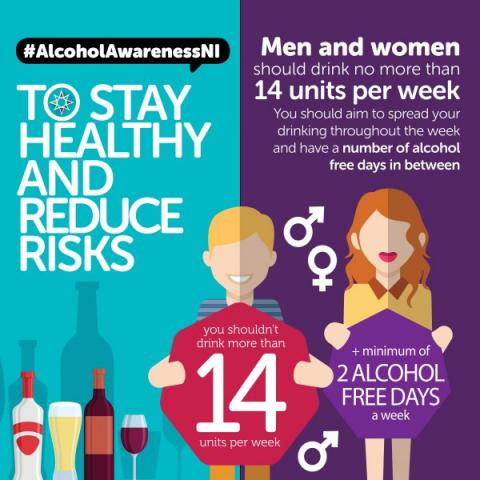Alcohol Awareness Week NI – Do you know your units?

The Public Health Agency (PHA) is urging people to keep an eye on their alcohol intake as they kick start Alcohol Awareness Week (20–26 June), emphasising the importance of knowing your limits and the effects that excess alcohol can have on your health and your safety.
This is the first Alcohol Awareness Week to be led by the PHA and Northern Ireland’s Drug and Alcohol Coordination Teams (NIDACTs).
Kelly Gilliland, Senior Health Improvement Officer, PHA said: “For 2016, we’re focusing on highlighting the updated Alcohol guidance that was launched back in January by the four UK Chief Medical Officers which provides information on ‘low risk’ drinking as opposed to ‘safe’ or ‘sensible drinking’ as there is no level of drinking alcohol without any risk.
“The new alcohol guidelines recommend that both men and women drink no more than 14 units per week. If you do drink as much as 14 units per week, it is best to spread this evenly over three days or more. You can't ‘save up’ your units for a particular day or a party. Binge drinking can have a major impact on your health such as causing damage to the liver, heart, brain and stomach. Overindulging in alcohol can also spoil events for you, your family and friends."
For small changes that can make a big difference, try to follow these simple tips:
- Always look after yourself and know what your limits are;
- Have something to eat before you start drinking to slow down the absorption of alcohol;
- Alternate each alcoholic drink with a non-alcoholic drink; for example water or a soft drink;
- Take frequent five minute breaks from drinking to give your body time to recover;
- Avoid drinking in rounds or having a kitty as this may result in you drinking more;
- Keep track of your drinks and don’t let anyone top up your drink until it’s finished;
- If a friend does drink too much, don't leave them alone or let them wander off, rather, encourage them to re-hydrate with non-alcoholic drinks.
Download and complete our quick self-checking template here.
Kelly continued: “If you are pregnant, or are trying for a baby, as a precaution you should not drink ANY alcohol at all. If you are a parent and you’re concerned that your child may be drinking or thinking about drinking alcohol – TALK TO THEM – make it clear what your rules and expectations are – view or download 'You, Your Child and Alcohol' for more information and advice.
“To find out more about alcohol visit www.knowyourlimits.info or to get help from a professional – either for yourself, or someone you care for or are concerned about, visit the ‘Services Near You’ section here.”
Highlighting this year’s Alcohol Awareness Week Health Minister Michelle O’Neill said: “Alcohol plays many roles in our society – both good and bad. However, it is clear that excessive alcohol consumption has a negative impact on people’s physical and mental health, on family relationships, on our local communities, on crime and community safety, and on our economy. It is estimated that alcohol misuse costs up to £900 million each and every year, with almost £250million of these costs borne by the Health and Social Care Sector.
“I am pleased that this year’s Alcohol Awareness Week promoted by the Public Health Agency provides an opportunity to highlight the harm alcohol causes and the support available to those in need. It also offers us a chance to reflect on our own alcohol consumption and ensure that we drink at levels that helps minimise any potential risks to our health.”
Visit our social media pages throughout the week (NIDACTS on Facebook and Twitter), repost/retweet our messages, and let us know what you are doing to raise awareness during Alcohol Awareness Week using the hashtag #AlcoholAwarenessNI
